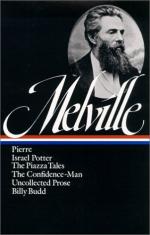As busy swallows about barn-eaves and ridge-poles, some of the Richard’s marksmen, quitting their tops, now went far out on their yard-arms, where they overhung the Serapis. From thence they dropped hand-grenades upon her decks, like apples, which growing in one field fall over the fence into another. Others of their band flung the same sour fruit into the open ports of the Serapis. A hail-storm of aerial combustion descended and slanted on the Serapis, while horizontal thunderbolts rolled crosswise through the subterranean vaults of the Richard. The belligerents were no longer, in the ordinary sense of things, an English ship and an American ship. It was a co-partnership and joint-stock combustion-company of both ships; yet divided, even in participation. The two vessels were as two houses, through whose party-wall doors have been cut; one family (the Guelphs) occupying the whole lower story; another family (the Ghibelines) the whole upper story.
Meanwhile, determined Paul flew hither and thither like the meteoric corposant-ball, which shiftingly dances on the tips and verges of ships’ rigging in storms. Wherever he went, he seemed to cast a pale light on all faces. Blacked and burnt, his Scotch bonnet was compressed to a gun-wad on his head. His Parisian coat, with its gold-laced sleeve laid aside, disclosed to the full the blue tattooing on his arm, which sometimes in fierce gestures streamed in the haze of the cannonade, cabalistically terrific as the charmed standard of Satan. Yet his frenzied manner was less a testimony of his internal commotion than intended to inspirit and madden his men, some of whom seeing him, in transports of intrepidity stripped themselves to their trowsers, exposing their naked bodies to the as naked shot The same was done on the Serapis, where several guns were seen surrounded by their buff crews as by fauns and satyrs.
At the beginning of the fray, before the ships interlocked, in the intervals of smoke which swept over the ships as mist over mountain-tops, affording open rents here and there—the gun-deck of the Serapis, at certain points, showed, congealed for the instant in all attitudes of dauntlessness, a gallery of marble statues—fighting gladiators.
Stooping low and intent, with one braced leg thrust behind, and one arm thrust forward, curling round towards the muzzle of the gun, there was seen the loader, performing his allotted part; on the other side of the carriage, in the same stooping posture, but with both hands holding his long black pole, pike-wise, ready for instant use—stood the eager rammer and sponger; while at the breech, crouched the wary captain of the gun, his keen eye, like the watching leopard’s, burning along the range; and behind all, tall and erect, the Egyptian symbol of death, stood the matchman, immovable for the moment, his long-handled match reversed. Up to their two long death-dealing batteries, the trained men of the Serapis stood and toiled in mechanical magic of discipline. They tended those rows of guns, as Lowell girls the rows of looms in a cotton factory. The Parcae were not more methodical; Atropos not more fatal; the automaton chess-player not more irresponsible.




